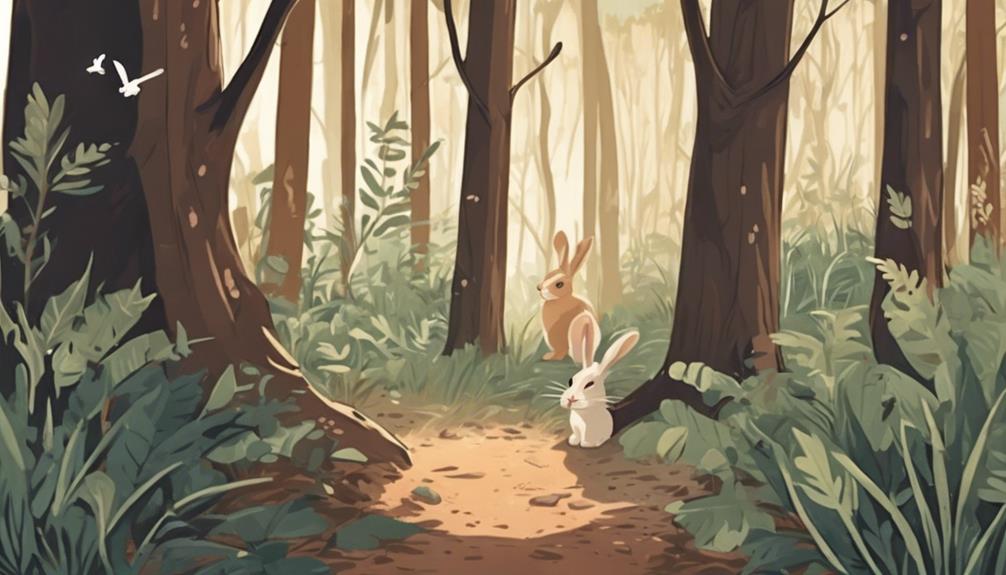Thinking about setting a bunny free in the wild brings up conflicting thoughts. On one hand, it might seem like a compassionate act, giving them a taste of freedom. However, the reality behind this decision is far more complex.
The welfare of domestic bunnies and their ability to survive in the wild is a matter that requires careful consideration. Before you make any hasty choices, it's essential to understand the implications and potential consequences of releasing a bunny into an environment drastically different from the one they're accustomed to.
Contents
- 1 Key Takeaways
- 2 Considerations Before Releasing a Bunny
- 3 Impact of Releasing Domestic Bunnies
- 4 Risks of Releasing Pet Bunnies
- 5 Alternatives to Releasing Bunnies
- 6 Wildlife Vs. Domestic Rabbit Release
- 7 Legal and Ethical Aspects of Bunny Release
- 8 Bunny Rescues and Rehoming
- 9 Responsible Actions for Pet Bunnies
- 10 Frequently Asked Questions
- 11 Conclusion
Key Takeaways
- Releasing bunnies is unethical due to lack of survival skills.
- Domestic bunnies harm ecosystems and native wildlife.
- Pet bunnies face risks like predation and disease outdoors.
- Consider safe alternatives like shelters or rescue organizations.
Considerations Before Releasing a Bunny

Before releasing a bunny into the wild, consider the ethical implications and potential consequences of this action carefully. Domestic rabbits lack the necessary survival instincts needed to thrive in the wild. When released, they face a high risk of death due to their inability to find food, shelter, and protect themselves from predators. Unlike baby wild rabbits that are born with innate instincts to survive, pet rabbits are dependent on human care and are essential for the challenges of the wild.
Releasing a domestic bunny into the wild not only jeopardizes its own well-being but also poses a threat to the local ecosystem. These rabbits can introduce diseases to wild populations, disrupt the balance of the environment, and compete with native species for resources. Ethically, releasing a pet rabbit is considered cruel and a betrayal of trust. It condemns the rabbit to a short and harsh life, filled with hunger, disease, stress, dehydration, and the constant threat of predation. Before making the decision to release a bunny, it's crucial to understand the implications and responsibilities that come with caring for these gentle creatures.
Impact of Releasing Domestic Bunnies
Releasing domestic bunnies into the wild can have significant ecological repercussions and disrupt local ecosystems due to their lack of essential survival skills resulting from selective breeding. Domestic rabbits, when released into the wild, face numerous challenges that can harm both the bunnies and the environment.
Here are three key points to ponder:
- Survival Skills: Domestic bunnies lack the necessary instincts and behaviors to survive in the wild, such as finding food and shelter, which puts them at a disadvantage.
- Ecological Damages: The presence of released domestic rabbits can lead to overgrazing of vegetation, soil erosion, and disruption of native species' habitats, causing imbalances in the ecosystem.
- Competition with Native Wildlife: Releasing pet bunnies introduces competition for resources with local wildlife, potentially leading to food scarcity and conflicts among species.
Considering these factors, releasing domestic bunnies into the wild can have far-reaching negative consequences, impacting not only the bunnies themselves but also the delicate balance of the surrounding ecosystem.
Risks of Releasing Pet Bunnies

Considering the detrimental impacts of releasing domestic bunnies into the wild, it's essential to recognize the inherent risks associated with letting pet bunnies roam free in unfamiliar environments. Pet rabbits, accustomed to human care, lack the natural instincts to survive in the wild. This makes them vulnerable to predation by other animals, leading to a high risk of harm or death. Additionally, these cute creatures may struggle to find suitable food and shelter, further endangering their well-being.
When pet bunnies are released into the wild, there's also a significant risk of exposure to diseases prevalent in unfamiliar environments. Their lack of immunity to such illnesses puts them in danger and poses a potential threat to wild populations as well. Additionally, the release of pet rabbits can disrupt the balance of ecosystems by introducing competition for resources with native wildlife, impacting the overall biodiversity. It's essential to take into account the well-being of these animals and the environment before deciding to release a pet bunny into the wild.
Alternatives to Releasing Bunnies
Consider safe rescue options like finding new caregivers or surrendering the bunny to rescue organizations.
Wildlife rehabilitation centers can provide proper care and support for bunnies in need.
Choosing humane euthanization over releasing pets into the wild is a compassionate decision that prioritizes the well-being of the animals.
Safe Rescue Options
When seeking safe rescue options for bunnies in need of new caregivers, consider surrendering them to rescue organizations or shelters as a vital alternative to releasing them into the wild. Local animal control, Rabbit Rescue, and shelters offer compassionate solutions for bunnies requiring support. Utilizing humane euthanization options safeguards the well-being of bunnies in distress.
Finding new caregivers who can provide a loving and secure environment for these pet rabbits is essential for their safety and happiness. Avoiding the release of bunnies into unfamiliar and harsh environments is necessary to protect these vulnerable animals. By exploring these safe rescue options, you can contribute to the welfare of bunnies in need of care and support.
Wildlife Rehabilitation Centers
To guarantee the well-being of bunnies in need of care and support, exploring wildlife rehabilitation centers as alternatives to releasing them into the wild is a proactive and responsible choice. Wildlife rehabilitation centers provide essential care and have trained staff who assess the bunny's health, provide medical treatment, and offer a safe recovery environment. These centers aim to release rehabilitated bunnies back into their natural habitats, ensuring their best chance at survival. By seeking help from wildlife rehabilitation centers, individuals contribute to the conservation of wild bunny populations. The expert care and rehabilitation services offered by these centers play an essential role in promoting the well-being and sustainability of wild bunnies.
| Benefits of Wildlife Rehabilitation Centers | ||
|---|---|---|
| Essential care | Trained staff | Conservation |
Wildlife Vs. Domestic Rabbit Release

Releasing a domestic rabbit into the wild poses significant risks due to their lack of survival skills and inability to adapt to natural environments. Domestic rabbits aren't equipped to fend for themselves in the wild, unlike their wild counterparts. When released into unfamiliar territory, they face numerous challenges:
- Struggle for Food: Domestic rabbits are used to being fed by humans and may not know how to forage for food in the wild.
- Shelter Shortage: Without human-provided shelter, domestic rabbits may struggle to find suitable places to hide and rest.
- Increased Predation Risk: Being domesticated, these rabbits lack the instincts to evade predators effectively.
It is vital to understand that domestic rabbits rely on humans for care and shouldn't be released into the wild. Proper care involves providing a safe and nurturing environment, ensuring the well-being of these pets. Releasing them into the wild isn't just unkind but also endangers their lives.
Legal and Ethical Aspects of Bunny Release
Domestic rabbits released into the wild not only face significant challenges to their survival but also raise complex legal and ethical dilemmas regarding animal welfare and environmental impacts. Releasing a domestic house rabbit into the wild can have severe consequences. In many jurisdictions, it's illegal due to animal cruelty laws. Authorities struggle to enforce these laws, given the difficulty of monitoring such actions.
Ethically, releasing pet rabbits can harm native wildlife and ecosystems. These actions may disrupt the balance of existing ecosystems and endanger both the released rabbits and wild populations. Not only does releasing pet rabbits pose risks to the environment and agriculture, but it can also harm feral rabbit populations.
Understanding the legal and ethical implications of releasing pet rabbits is essential for promoting responsible pet ownership and safeguarding the welfare of both domestic and wild rabbits. Remember, proper rabbit care involves ensuring their well-being without causing harm to the environment or native wildlife.
Bunny Rescues and Rehoming

Rescuing and rehoming bunnies plays an essential role in ensuring their well-being and promoting responsible pet ownership. Rabbit rescues, such as the House Rabbit Resource Network (HRRN), are dedicated to the rescue, rehabilitation, and adoption of domestic rabbits. These organizations not only provide a second chance for these animals but also educate the public on proper house rabbit care, emphasizing the importance of responsible pet ownership.
Domestic rabbits shouldn't be released into the wild, as they lack the survival skills necessary to thrive in natural environments. Local wildlife could be negatively impacted by the introduction of domesticated rabbits into the ecosystem. Rabbit rescues work tirelessly to find loving homes for these animals, ensuring they receive the care and attention they deserve.
Responsible Actions for Pet Bunnies
When considering responsible actions for pet bunnies, it's important to understand their habitat requirements and the potential dangers they face outdoors.
You must make sure that your bunny has a safe and secure living environment, providing appropriate shelter, food, and protection from harm.
Taking proactive steps to safeguard your pet bunny's well-being reflects ethical pet ownership and compassion towards domestic rabbits.
Bunny Habitat Considerations
Considering the ideal habitat for pet bunnies involves providing them with a safe and enriching environment that meets their physical and psychological needs. When creating a suitable living space for pet bunnies:
- Guarantee Space: Make sure they have a spacious enclosure with room to hop, stretch, and explore.
- Hideouts and Shelter: Provide hiding spots and cozy shelters for them to feel secure.
- Enrichment Activities: Offer toys, tunnels, and safe items to chew on to keep them mentally stimulated.
Creating a habitat that caters to the natural behaviors and instincts of pet bunnies is essential for their well-being and happiness. Remember, a well-designed environment contributes to their overall health and contentment.
Potential Dangers Outdoors
Releasing a pet bunny into the wild poses significant risks and challenges that must be carefully considered to guarantee their well-being and safety. Pet bunnies lack the necessary survival skills to thrive in the wild environment, making them vulnerable to predators and diseases. Domestic bunnies may struggle to find food sources and suitable shelter, leading to difficulties adapting to the challenges of the wild.
Additionally, releasing pet bunnies into the wild can disrupt local rabbit populations and is considered animal cruelty in many jurisdictions. To assure responsible actions, it's critical to explore alternatives such as finding proper rehoming options, surrendering to shelters, or seeking humane euthanization for pet bunnies in need.
Frequently Asked Questions
Can I Release a Bunny Back Into the Wild?
You should consider wildlife rehabilitation for the bunny. Understand rabbit behavior, habitat needs, and species conservation. Be mindful of predation risks. Releasing the bunny into the wild requires careful planning and consideration for its well-being and survival.
Can You Release a Domestic Rabbit Into the Wild?
You should not release a domestic rabbit into the wild. Wildlife rehabilitation centers can be helpful. Environmental impact is severe when pet rabbits are abandoned. Responsible pet rabbit care prevents population control issues and habitat destruction.
Can I Let My Rabbit Out in the Wild?
You should not let your pet rabbit out in the wild. Rabbit behavior, outdoor dangers, and habitat requirements make it unsafe. Wild predators pose a threat. Responsible pet ownership means keeping your pet rabbit safe indoors.
When Can You Release Baby Rabbits Into the Wild?
When releasing baby rabbits into the wild, timing matters. Make sure they are fully furred, have open eyes, and can hop. Guiding nocturnal animals at dusk and diurnal animals in the morning aids their adjustment. Monitor their ability to forage before release.
Conclusion
As you ponder releasing a bunny into the wild, remember the tangled web of consequences that ensue. Like a delicate thread in a vast tapestry, these domestic creatures aren't meant to navigate the untamed wilderness alone.
Consider the ripple effect of your actions, for every choice has a lasting impact on the intricate balance of nature. Choose compassion over recklessness, and seek out responsible alternatives to guarantee the well-being of these gentle souls.






